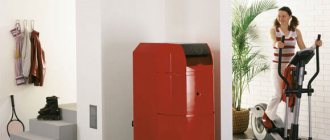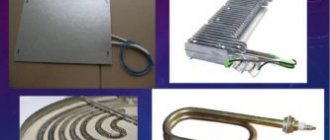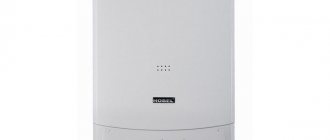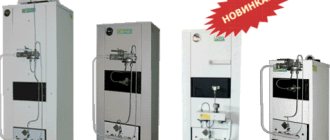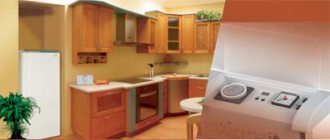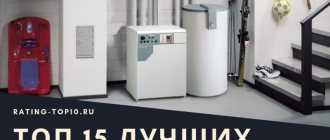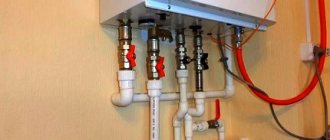Types and features of electric water heating boilers
Manufacturers offer several equipment options. The devices are single- and double-circuit. The latter are capable of providing hot water supply and additionally heating the air in the premises.
Devices are also divided according to the type of heating element. Boilers are tubular, induction and electrode. Also, dual-circuit devices are produced in 1- and 3-phase.
Wall-mounted and floor-mounted models are available on the market. The latter are more productive, provide sufficient water even for taking a bath, and are suitable for heating a large area. However, unlike their wall-mounted counterparts, they are not compact and often require a separate room.
Types of water heating boilers
There are two types of water heating boilers - gas and electric. The first type of equipment is the most economical, but it is easy to install them only in those houses where a gas water heater was initially provided. Otherwise, the owner will have to spend money on obtaining a permit, installing a chimney and installing the boiler itself. Therefore, for private homes, it is preferable to choose electric water heating boilers.
According to the type of water heating, electric water heaters are divided into two groups - flow-through and storage boilers.
Instantaneous water heaters heat water to the desired temperatures in a matter of seconds and have compact sizes, ideal for apartments with a standard layout. However, instant heating of water requires a lot of electricity, and old wiring and an electric meter are not suitable for it, which may not withstand the power of a flow-through water heating boiler.
Storage water heaters are the most popular among boiler users today. This is due to the fact that this type of device not only heats water, maintains it at a certain temperature and does not require special conditions for installation. Even old wiring can withstand its power, but when using a storage boiler you need to correctly calculate its volume.
What is included
Manufacturers supply units with various parts, which determines the cost of the equipment.
The kit includes an expansion tank, circulation pump and programmer. Often the devices are equipped with protection against overheating and freezing of water, automatically preventing a drop in pressure in the system.
The equipment is equipped with pressure gauges and thermometers. Many devices have liquid filters.
Principle of operation
The functions of boilers depend on their type. However, their main purpose is to heat the liquid to the required temperature. The differences between the devices based on the operating principle lie in the method of converting electricity into heat.
For example:
- Unit with heating element. Current passes through the tungsten wire, thereby heating it. The resulting heat increases the temperature of the liquid circulating inside the tank through the quartz filling and the body. The water then goes to heating radiators or is used for hot water supply.
- Electrode apparatus. A “neutral” wire is connected to a steel cylindrical body; an electrode with a “phase” connected is installed inside. The pump drives undistilled water, which has electrical resistance. When current is passed through a liquid, the latter heats up.
- Induction. Electricity passes through a wire-wrapped coil that has a metal core. The resulting eddy currents heat the latter. Since it is washed with water, the liquid heats up.
Economical boilers
On sale you can find two types of electric boilers, which are positioned by manufacturers and sellers as economical:
| Image | Description |
| Induction: a core placed in a dielectric shell is heated by eddy currents induced by the external winding. |
| Electrode: Water is heated when current flows through it between two electrodes. |
More details about boilers in the video:
The key features of both boilers directly follow from their design:
- The advantage of an induction boiler is extreme fault tolerance and the ability to operate indefinitely without maintenance. There are no components that wear out or degrade during operation;
- The advantages of an electrode boiler are maximum power with minimal dimensions and absolute safety. If the circuit depressurizes and the electrodes dry out, water heating will stop not due to the activation of the boiler safety systems, but simply due to the physical principle of its operation.
Electrode "Galan Hearth" with a power of 3 kW (bottom left)
It is useful for a potential buyer to know two features of electrode boilers:
- They work only with water, and only with a certain mineral composition;
- The electrodes gradually dissolve and need to be replaced periodically.
Could these electric boilers for water supply and heating be more economical than heating elements?
No. These are classic direct-heating devices: electricity is almost completely converted into heat. They do not and cannot have additional sources of thermal energy. The law of conservation of energy specifically for these two devices has not been canceled.
Not only that: the winding of an induction boiler will heat up when high currents pass through and dissipate more heat into the surrounding space than heating elements in a heat-insulated heat exchanger.
Currents flowing through the winding heat it to a relatively high temperature.
Conclusion: so-called economical electric boilers exist only in the imagination of sellers and marketers.
Real savings
Is it possible to reduce the cost of electric heating and domestic hot water preparation using electricity?
Yes. Key words - “night tariff”.
The generation power in the energy system of the country and individual regions changes slightly during the day, but energy consumption at night drops significantly. It is impossible to accumulate large amounts of electricity at the current technological level.
To give consumers an incentive to use devices with high electricity consumption at night, during periods of low load, energy companies introduce separate tariffs:
- During the day, a kilowatt-hour costs more;
- At night, the cost of electricity decreases by 1.5-3 times.
To account for electricity consumption, you need a two-tariff meter
But excuse me, can an electric boiler for hot water supply and heating only be used at night?
It is possible if you supplement the circuit with a heat accumulator and an indirect heating boiler. A heat accumulator is a water tank with a volume of 300-3000 liters with external thermal insulation and several outlets for connecting water supply and heating circuits.
With a volume of 3 cubic meters, it is capable of storing almost 200 kilowatt-hours of heat, which is enough to heat a house of about 100 square meters during the day. At night, the boiler operating at full power heats the water in the tank, and during the day the accumulated energy is used to maintain the temperature of the heating devices.
Thermal accumulators or buffer tanks
An indirect heating boiler allows you to use the heat of the coolant from the heating system to heat hot water. In the summer, when the heating is turned off, the coolant circulates between it and the boiler or heat accumulator.
Floor-mounted indirect heating boiler
Advantages and disadvantages
Electric boilers have the following advantages:
- simple installation and simple operation after reading the instructions;
- no noise during operation;
- aesthetics (the equipment fits into any interior);
- lack of chimney;
- ability to set the required temperature.
However, there are also disadvantages. For example, it is not advisable to use units for large premises due to increased energy costs and the need to install reinforced wiring.
Electric boilers also require an uninterrupted power supply, otherwise they will not function.
Electric boilers for heating and hot water supply
Considering the issue of heating, it can be established that electric boilers attract the attention of potential buyers much more often. The main reason lies in the cost-effectiveness of such a device. Unlike boilers operating on other types of fuel, their efficiency is 100%. That is, all the energy received from the network undergoes a process of conversion into a similar thermal force, without losses allocated to discharge into the chimney, processing of impurities in the air, combustion of secondary waste, and so on. At the same time, heating devices of this type provide the possibility of adjustment in order to save energy. Based on user reviews, the most popular wall products are “Standard” and “Premium” class. Their power is designed for single-phase voltage and is capable of satisfying the needs of the average family living in an apartment or a medium-sized private house.
Units sold under the “Premium” brand have a higher price. But they were initially designed with the ability to connect to various types of microclimate systems and are equipped with an electronic control and protection unit. The opportunity to buy such products is used not only by individuals, but also by businesses engaged in business.
Hot water boilers, depending on the design principle, are divided into several types: heating element, electrode, induction, and so on. Regardless of the methods, they all perform water heating functions suitable for heating and supplying domestic needs.
Moreover, water boilers based on heating elements are more popular than induction ones, as they are safer, more economical and versatile. Going to the forum where this issue is discussed, you can notice another nuance: buyers are quite keenly interested in flow-through boilers. This is due to the fact that they are economical, compact and can complement any water supply system. Their sales are in full swing, and the number of new designs is constantly replenishing the market.
Heating systems using electric boilers are absolutely safe, economical and do not require constant supervision. At the same time, heating is carried out depending on the complexity of the model: with self-monitoring of the system, remote control, automatic settings, in constant mode. No matter how the heating device is designed, it performs its functions properly over a long period. Therefore, the operation of an electric water boiler completely covers all costs.


